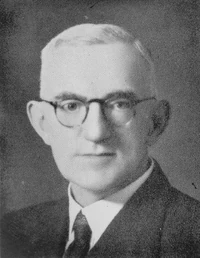|
Prime Minister of Scotland | |
| Predecessor | Michael James Stewart |
| Successor | Robert MacDonald |
|
Deputy Prime Minister | |
| Predecessor | TBD |
| Successor | TBD |
|
Minister of Transport | |
| Predecessor | TBD |
| Successor | TBD |
| Born | October 16, 1885 |
| Died | November 13, 1947 |
| Spouse | Lorna Nicholson |
| Political Party | Labour Party |
| Profession | Politician |
Henry Richard Nicholson (October 16, 1885 - November 13, 1947) was a Scottish Labour Party politician who served as Prime Minister of Scotland and Leader of the Labour Party from 1942 to 1947. He previously served as Deputy Prime Minister from 1935 to 1942.
It was during his period in office that most of the legislation affecting the creation of the welfare state was passed, including the Health Service Act 1946, the Pension Reform Act 1947 and Child and Sickness benefits.
In November 1947 he became the second (and most recent) Prime Minister of Scotland to die in office.
Early Life
Political Career
Nicholson entered parliament as MP for Perthshire in 1925.
At the 1931 election he lost his seat.
He was re-entered parliament at a by-election in 1933 for Glasgow South West, a seat he was to hold until his death. Almost immediately after his return to parliament he was elected Deputy Leader of the Labour Party.
Labour won the 1935 election in a landslide, forming its first majority government. Nicholson was appointed Deputy Prime Minister, with special responsibility for shepherding the government's ambitious agenda through Parliament. On June 22nd 1942 Prime Minister Michael James Stewart suddenly died from a heart attack, shocking the Labour Party and the country. As Deputy Prime Minister, and Deputy Leader of the Labour Party Nicholson was the obvious choice to suceed Stewart on an interim basis, until the Labour Party could elect a new Leader. Only hours after Stewart's death Parliament elected Stewart Prime Minister without a single vote being cast against him (something which has not happened before or since).
Initially it seemed that cabinet ministers Robert MacDonald, James Bell and Matthew Wilson would all run for the leadership in a tight and divisive race, something many within the Labour Party sought to avoid. Nicholson himself was reluctant to run for the leadership, telling colleagues that he was "one of life's natural Deputies". It was only when both MacDonald and Bell visited him separately on the evening on June 25th, both saying they would not run for the leadership as long as he stood that he reluctantly allowed his name to go forward. Wilson did stand against Nicholson, but was defeated in the parliamentary ballot by 15 votes to 76.
Prime Minister
Upon his election as Labour Leader Nicholson declared his desire to complete Stewart's "unfinished business" with regard to the establishment of a full and comprehensive Scottish welfare state.
Nicholson's 5 years as Prime Minister saw more legislation brought forward than any other government before or since, and went much further than the Stewart government in terms of social legislation. The 1946 Health Service Act saw the establishment of a National Health Service, delivering healthcare free at the point of delivery.

